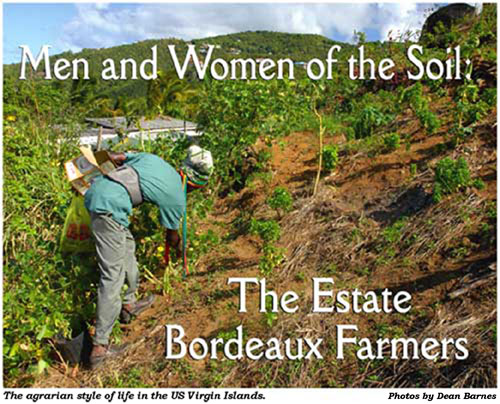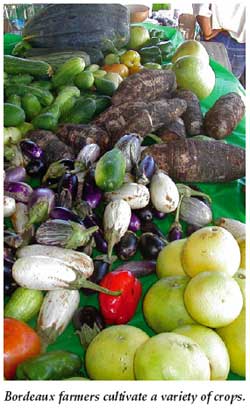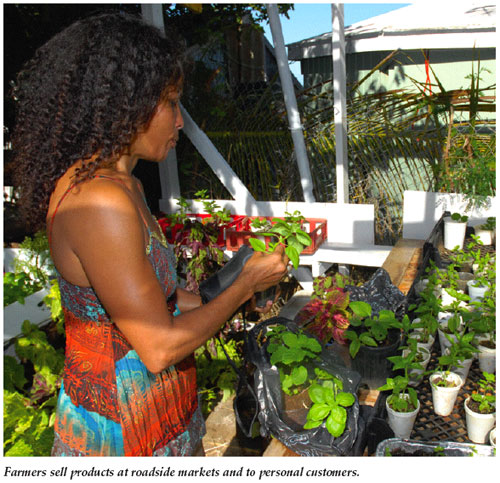 Agriculture has always had deep cultural and historical roots throughout the Caribbean region and the Virgin Islands are no exception. Arawak and Carib Indians, the first known agriculturists in the region, complemented the bounty of the seas by planting peppers, yams, beans, sweet potatoes, corn and cassava. During the heyday of plantation agriculture, cotton, tobacco, indigo and sugarcane fields covered much of the islands. Enslaved Africans commonly grew provisions and raised livestock for local consumption. Later on, after the demise of the plantations, large tracts of land on the eastern end of St. Thomas were devoted to raising livestock. French immigrants from the island of St. Barts began arriving in the mid 19th century. Many settled on the north side of the island where they fished and farmed. These days their presence is not as pervasive as it once was, but for decades, “Frenchie” farmers were a mainstay in providing fresh produce to the island’s residents. Up until 1995, for example, Holstein cows were an integral part of a dairy located in the hills above Magens Bay.
Agriculture has always had deep cultural and historical roots throughout the Caribbean region and the Virgin Islands are no exception. Arawak and Carib Indians, the first known agriculturists in the region, complemented the bounty of the seas by planting peppers, yams, beans, sweet potatoes, corn and cassava. During the heyday of plantation agriculture, cotton, tobacco, indigo and sugarcane fields covered much of the islands. Enslaved Africans commonly grew provisions and raised livestock for local consumption. Later on, after the demise of the plantations, large tracts of land on the eastern end of St. Thomas were devoted to raising livestock. French immigrants from the island of St. Barts began arriving in the mid 19th century. Many settled on the north side of the island where they fished and farmed. These days their presence is not as pervasive as it once was, but for decades, “Frenchie” farmers were a mainstay in providing fresh produce to the island’s residents. Up until 1995, for example, Holstein cows were an integral part of a dairy located in the hills above Magens Bay.
 To the casual visitor – especially on St. Thomas – it may appear that in 2007, this agrarian style of life has given way completely to cruise ship docks, tour buses, bustling shopping districts, upscale resorts and condominiums. Not so. Many residents still supplement their diets or income by maintaining small land holdings where, just as their ancestors did, they continue to raise livestock, poultry, fruits, herbs and vegetables.
To the casual visitor – especially on St. Thomas – it may appear that in 2007, this agrarian style of life has given way completely to cruise ship docks, tour buses, bustling shopping districts, upscale resorts and condominiums. Not so. Many residents still supplement their diets or income by maintaining small land holdings where, just as their ancestors did, they continue to raise livestock, poultry, fruits, herbs and vegetables.
Today, the largest concentration of farmers on St. Thomas is located on the western end of the island in Estate Bordeaux where the Virgin Islands government has set aside a parcel of land for agriculture purposes. There are some 50 farm plots here ranging in size from one to five acres. A good number of the farmers embrace the Rastafarian life style – but not all. There are livestock farmers who raise pigs and some who keep sheep, goats or a few head of cattle. The goat of choice these days is the Boer, a breed originating in South Africa; the sheep – the Barbados black belly and the Virgin Islands short hair; and the cow – the Senepol, developed on St. Croix. These breeds of livestock are suited for a tropical climate and raised primarily for meat production.
Rather than practicing monoculture agriculture, the majority of Bordeaux farmers cultivate a variety of crops. Charles Leonard’s farm is an excellent example of such a sustainable and diverse operation. Besides orchards and produce and herb gardens, he maintains beehives and raises chickens for eggs and meat.
In the past few years, an increasing number of farmers have been following Leonard’s example by establishing their own beekeeping operations. Dr. Akil Peterson, Commissioner of Agriculture, sees a bright future for apiary pursuits in the territory. “The Virgin Islands are ideal for a beekeeping industry,” he says, “because we have a year round growing season and we are relatively isolated from a lot of the pests and disease problems that occur in other places in the world.”
Another Bordeaux beekeeping farmer, Eldridge Thomas, is also famous on the island for the delicious juices he makes from local fruits. Some of his offerings include mango, tamarind, soursop, guava, passion fruit, sorrel and papaya. Look for his booth at special events like the annual St. Thomas-St. John Agriculture and Food Fair each November.
The farmers mainly sell their products at roadside markets and to personal customers. The Saturday morning market in downtown Charlotte Amalie at Market Square is perhaps their most important outlet. This is where Charles Leonard sells the honey, eggs and dressed chickens he raises. Other farmers offer fresh herbs, vegetables and fruits in season. If you would like to experience the full flavor of this market, it is best to go early. If 5:00 or 6:00 am is too early for you, then 7:00 or 8:00 am will have to do.
In addition, on the last Sunday of every month there is a farmer’s market at the old Bordeaux tennis courts from 10:00 am to 4:00 pm. You can find orchard and garden produce, freshly baked bread, locally produced charcoal, Rastafarian “ital” food and homemade juices.
Every year in January, the Bordeaux farmers sponsor a weekend- long fair, which has become an eagerly awaited island event. Along with the farm produce, there is music, poetry, arts and crafts, food, farm tours and demonstrations.
To obtain further information about the Bordeaux farmers’ markets and activities, you can contact Derek “Alpha” Hodge, the current president of We Grow Food, Inc. You can reach him at the following telephone number: 774-5182.

